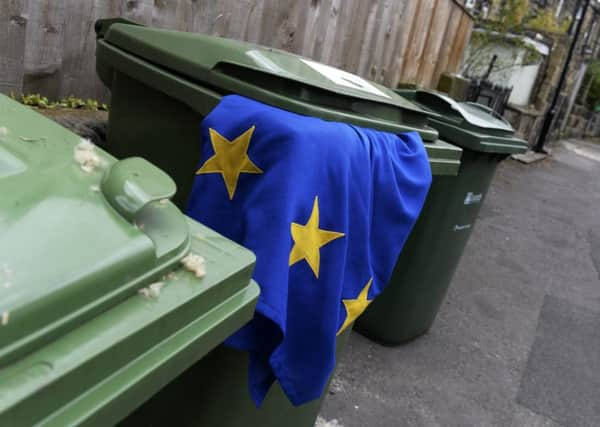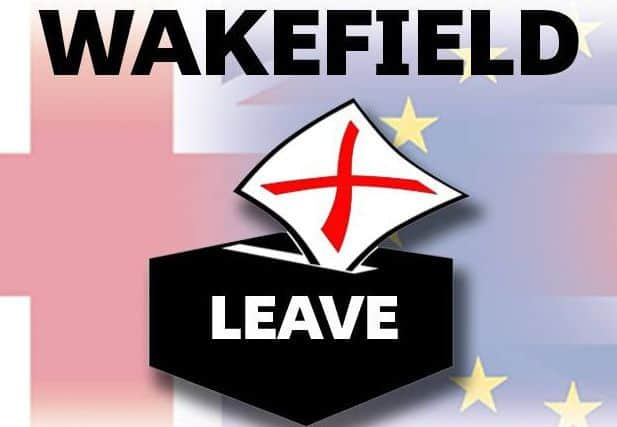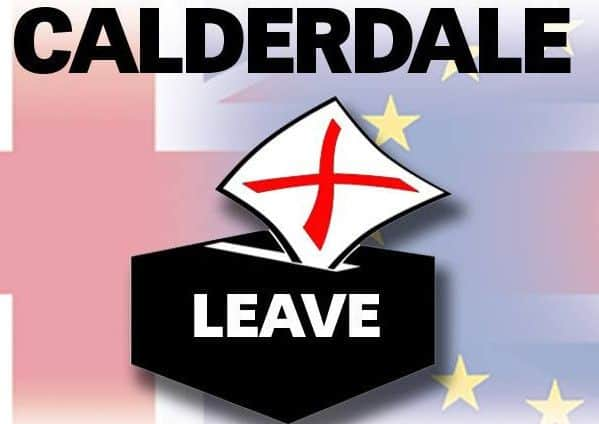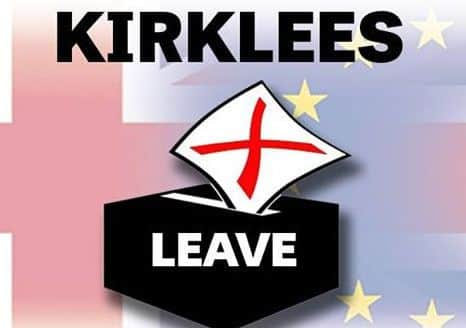As pound plunges to 31-year low, how will Brexit affect your holiday money?


Sterling was down against every single major currency group.
The pound crashed 10% against the dollar overnight to 1.33 US dollars, a low not seen in 30 years. The reaction of the worlds markets is unlike anything the UK has seen in its recent economic history or during the financial crisis’ of the early 1990s or 2008.
Advertisement
Hide AdAdvertisement
Hide AdThe pound fell in value twice as much as it did on Black Wednesday in 1992.
The Bank of England governor is expected to give a statement later this morning.
In a closely-fought contest, the Leave camp passed the winning post of 16,757,766 with eight of the 382 voting areas still to declare, heading for an overall majority of 52 percent to 48 percent.
Sterling lost more than 10 percent against the US dollar, as traders responded with panic to the prospect of the UK quitting the European Union after 43 years.
Advertisement
Hide AdAdvertisement
Hide AdWith Prime Minister David Cameron expected to address the nation from Downing Street before financial markets opened, Labour said he should “seriously consider his position”, while Mr Farage said he should resign immediately after voters rejected his passionately-expressed advice to stay in the EU.


John McDonnell MP, Labour’s Shadow Chancellor, said: “People will be waking up this morning to turmoil in the markets and the pound crashing, and fearing the emergency budget the Chancellor threatened to hike their taxes and cut public services.
“The Government must now take steps to stabilise the economy, and to protect jobs, pensions and wages. Labour will not allow any instability to be paid for by the working people of this country.”
Financial markets plunged on Friday, with sterling hitting a 31-year low in its biggest fall on record after Britain voted to leave the European Union.
Advertisement
Hide AdAdvertisement
Hide AdTraders are gearing up for a huge plunge in stock market values when the FTSE opens at 8am this morning with UK stock futures pointing to a very steep fall in the value of Britain’s biggest companies.


Bonds also sold off sharply, pushing UK government borrowing costs sharply higher, as traders and investors grappled with the market implications of the Brexit vote.
The pound had hit a 2016 high of over $1.50 after an earlier opinion poll showed an outcome in favour of Remain, but fell nearly 17 cents from that peak as area counts came in and TV stations said the Brexit camp had won the landmark referendum.
Sterling’s fall of 10 per cent was historic, marking a decline greater than anything seen since free-floating system of exchange rates was introduced in the early 1970s.
Advertisement
Hide AdAdvertisement
Hide AdIt was even bigger than on “Black Wednesday“ in 1992, when billionaire financier George Soros was instrumental in pushing the pound out of the Exchange Rate Mechanism.


London bankers working through the night said they hadn’t seen anything like the volatility sweeping across UK assets.
“It’s back to the future. We’re back to where we were in 1985,” said Nick Parsons, co-head of global currency strategy at NAB.
“We’ve had a 10 per cent decline in six hours. That’s simply extraordinary, and a vote to leave provides an existential crisis for Europe,” he said.
Advertisement
Hide AdAdvertisement
Hide AdSterling fell as low as $1.3305, its weakest level against the dollar since September 1985. It fell 6 per cent against the euro and 15 per cent against the yen.
Banks are expected to be the worst hit, as Hong Kong listings of HSBC and Standard Chartered plunged as much as 10 per cent.
“It’s extraordinary. ‘Shock’ probably isn’t too strong a word,” said John Wraith, head of UK rates strategy at UBS Investment Bank.


The UK referendum’s impact was global. US Treasury yields fell sharply as investors rushed to the safety of US government debt, while other safe-haven assets like gold and the Japanese yen jumped.
Advertisement
Hide AdAdvertisement
Hide AdInvestors are now bracing themselves for possible intervention from central banks or finance ministries to stabilise markets.
The referendum on whether to quit the EU was bitterly contested, and polarised the nation. Financial markets, on edge for weeks over the uncertain outcome, had rallied on the strength of late polls that showed a swing towards staying in, perhaps setting them up for the steep fall.
Joe Rundle, head of trading at ETX Capital, described the win for Leave as the “one of the biggest market shocks of all time”.
He said: “The pound has collapsed to its lowest level in over 30 years, suffering its biggest one-day fall in living memory. Panic may not be too strong a word - the pound could have further to go over the next couple of days as markets digest the news.
Advertisement
Hide AdAdvertisement
Hide Ad“It’s worth noting that trading desks are not fully staffed and these are only the initial reactions. We’re waiting for the big money to crank into action over the coming days and even weeks, which will likely exert further downward pressure on sterling.”
Piers Hillier, chief investment officer at Royal London Asset Management, said: “On the back of this morning’s result we expect the UK will fall into a recession. Unfortunately I see unstable market conditions lasting for between three and five years whilst new trade agreements are drawn up.
“It is our view that the UK Government will be left with no choice but to stimulate the economy through fiscal and monetary means, flooding the system with liquidity if necessary.”
This could make the UK a more affordable destination for overseas tourists.
Advertisement
Hide AdAdvertisement
Hide AdThe victory for the Leave campaign is unlikely to have any immediate ramifications for UK tourists passing through immigration controls abroad, or for inbound tourism.
A spokesman for Heathrow Airport said: “Anyone travelling through the airport will find it operating normally with no changes to security and immigration.”
Bill Gibbons, director of industry body Discover Ferries, which represents 12 ferry companies, insisted that the vote will not have an impact on summer travel plans.
“Ferries will continue to travel as normal and there will be no changes to routes or schedules,” he added. “It will be business as usual.”
Advertisement
Hide AdAdvertisement
Hide AdJoel Brandon-Bravo, UK managing director of travel deals company Travelzoo, warned that the referendum result would have an impact on the tourism industry in several ways.
He said: “The next 24 months of negotiations will be crucial for British travel - particularly if the UK Government wants to maintain inbound tourism from the EU, and avoid a price hike for Britons wanting to travel abroad for holidays.
“Obviously top priority is dealing with the impact the referendum result will have on the value of the pound, but there are other factors that could make the result a big blow for the travel industry.”
Mr Brandon-Bravo urged the Government to quickly negotiate how an independent UK will operate in the European Common Aviation Area.
Advertisement
Hide AdAdvertisement
Hide AdTravel organisation Abta warned during the referendum campaign that foreign travel was “likely to become more expensive” following Brexit.
It published a report which stated that holidaymakers and business travellers may face increased costs if an exit vote leads to a fall in the value of sterling, while travel businesses may also raise prices in order to recoup the cost of new taxes and levies being introduced.
Another potential factor which could make travel more expensive is consumers needing to cover additional insurance costs if the UK leaves the European Health Insurance Card scheme, according to the report produced with economic analysis by Deloitte.
The research concluded: “In the longer term, following a Brexit, travel is likely to become more expensive.”
Advertisement
Hide AdAdvertisement
Hide AdAndrew Swaffield, chief executive of low-cost airline Monarch, responded to the study by saying that the UK leaving the EU could lead to an increase in air fares and a reduction in the number of flights.